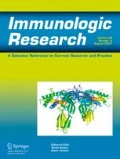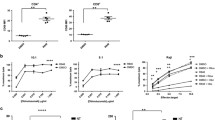Abstract
The FDA recently approved an agonistic anti-CD30 drug conjugate, Brentuximab vedotin, for the treatment for CD30-positive lymphomas. The potent clinical activity of Brentuximab vedotin in Hodgkin’s lymphoma and anaplastic large-cell lymphoma was greeted with great enthusiasm by oncologists as it provided a new treatment modality for these diseases. In this review, we will describe how we obtained the hybridoma by pursuing a basic research experiment unrelated to CD30. I will also review what we know about the normal biological functions of CD30 that were studied primarily in murine models of disease but also in patients. The picture emerging is that one of the primary functions of CD30 is the control of memory cells providing costimulation and trafficking information or inducing apoptosis in a microenvironment and cytokine milieu-dependent manner.
Similar content being viewed by others
References
Gulan G, et al. Systemic and local expression of perforin in lymphocyte subsets in acute and chronic rheumatoid arthritis. J Rheumatol. 2003;30:660–70.
Prpic L, Strbo N, Sotosek V, Gruber F, Podack ER, Rukavina D. Assessment of perforin expression in peripheral blood lymphocytes in psoriatic patients during exacerbation of disease. Acta dermato-venereologica Supplementum. 2000;14–16.
Laskarin G, et al. Progesterone directly and indirectly affects perforin expression in cytolytic cells. Am J Reprod Immunol. 1999;42:312–20.
Sotosek V, et al. Decidual macrophages are the population of decidual adherent cells which regulates perforin expression in cytolytic cells. Am J Reprod Immunol. 1999;42:76–82.
Strbo N, Laskarin G, Sotosek V, Randic LJ, Podack ER, Rukavina D. Modulation of perforin expression in the decidual and peripheral blood cytotoxic lymphocytes in culture. Am J Reprod Immunol. 1999;42:14–21.
Rukavina D, et al. Age-related decline of perforin expression in human cytotoxic T lymphocytes and natural killer cells. Blood. 1998;92:2410–20.
Bowen MA, Olsen KJ, Cheng L, Avila D, Podack ER. Functional effects of CD30 on a large granular lymphoma cell line, YT. Inhibition of cytotoxicity, regulation of CD28 and IL-2R, and induction of homotypic aggregation. J Immunol. 1993;151:5896–906.
Durkop H, Latza U, Hummel M, Eitelbach F, Seed B, Stein H. Molecular cloning and expression of a new member of the nerve growth factor receptor family that is characteristic for Hodgkin’s disease. Cell. 1992;68:421–7.
Schwab U, et al. Production of a monoclonal antibody specific for Hodgkin and Sternberg-Reed cells of Hodgkin’s disease and a subset of normal lymphoid cells. Nature. 1982;299:65–7.
Gerdes J, Schwarting R, Stein H. High proliferative activity of Reed Sternberg associated antigen Ki-1 positive cells in normal lymphoid tissue. J Clin Pathol. 1986;39:993–7.
Ralfkiaer E, et al. Expression of a Hodgkin and Reed-Sternberg cell associated antigen (Ki-1) in cutaneous lymphoid infiltrates. Arch Dermatol Res. 1987;279:285–92.
Bowen MA, Lee RK, Miragliotta G, Nam SY, Podack ER. Structure and expression of murine CD30 and its role in cytokine production. J Immunol. 1996;156:442–9.
Shanebeck KD, et al. Regulation of murine B cell growth and differentiation by CD30 ligand. Eur J Immunol. 1995;25:2147–53.
Gilfillan MC, Noel PJ, Podack ER, Reiner SL, Thompson CB. Expression of the costimulatory receptor CD30 is regulated by both CD28 and cytokines. J Immunol. 1998;160:2180–7.
Smith CA, et al. CD30 antigen, a marker for Hodgkin’s lymphoma, is a receptor whose ligand defines an emerging family of cytokines with homology to TNF. Cell. 1993;73:1349–60.
Duckett CS, Thompson CB. CD30-dependent degradation of TRAF2: implications for negative regulation of TRAF signaling and the control of cell survival. Genes Dev. 1997;11:2810–21.
Kurts C, Carbone FR, Krummel MF, Koch KM, Miller JF, Heath WR. Signalling through CD30 protects against autoimmune diabetes mediated by CD8 T cells. Nature. 1999;398:341–4.
Telford WG, Nam SY, Podack ER, Miller RA. CD30-regulated apoptosis in murine CD8 T cells after cessation of TCR signals. Cell Immunol. 1997;182:125–36.
Chiarle R, Podda A, Prolla G, Podack ER, Thorbecke GJ, Inghirami G. CD30 overexpression enhances negative selection in the thymus and mediates programmed cell death via a Bcl-2-sensitive pathway. J Immunol. 1999;163:194–205.
Grell M, et al. Induction of cell death by tumour necrosis factor (TNF) receptor 2, CD40 and CD30: a role for TNF-R1 activation by endogenous membrane-anchored TNF. EMBO J. 1999;18:3034–43.
Amakawa R, et al. Impaired negative selection of T cells in Hodgkin’s disease antigen CD30-deficient mice. Cell. 1996;84:551–62.
DeYoung AL, Duramad O, Winoto A. The TNF receptor family member CD30 is not essential for negative selection. J Immunol. 2000;165:6170–3.
Shimozato O, Takeda K, Yagita H, Okumura K. Expression of CD30 ligand (CD153) on murine activated T cells. Biochem Biophys Res Commun. 1999;256:519–26.
Wiley SR, Goodwin RG, Smith CA. Reverse signaling via CD30 ligand. J Immunol. 1996;157:3635–9.
Lorvik KB, Haabeth OA, Clancy T, Bogen B, Corthay A. Molecular profiling of tumor-specific T1 cells activated in vivo. Oncoimmunology. 2013;2:e24383.
Cerutti A, et al. Engagement of CD153 (CD30 ligand) by CD30 + T cells inhibits class switch DNA recombination and antibody production in human IgD + IgM + B cells. J Immunol. 2000;165:786–94.
Younes A, et al. CD30 ligand in lymphoma patients with CD30 + tumors. J Clin Oncol: Off J Am Soc Clin Oncol. 1997;15:3355–62.
Gattei V, et al. CD30 ligand is frequently expressed in human hematopoietic malignancies of myeloid and lymphoid origin. Blood. 1997;89:2048–59.
Cerutti A, et al. The CD5/CD72 receptor system is coexpressed with several functionally relevant counterstructures on human B cells and delivers a critical signaling activity. J Immunol. 1996;157:1854–62.
Azuma M, Cayabyab M, Buck D, Phillips JH, Lanier LL. Involvement of CD28 in MHC-unrestricted cytotoxicity mediated by a human natural killer leukemia cell line. J Immunol. 1992;149:1115–23.
Nam SY, et al. Regulation of lymphocyte clustering by CD30-mediated ICAM-1 up-regulation. Cell Immunol. 2002;219:38–47.
Muta H, Boise LH, Fang L, Podack ER. CD30 signals integrate expression of cytotoxic effector molecules, lymphocyte trafficking signals, and signals for proliferation and apoptosis. J Immunol. 2000;165:5105–11.
Heath WR, Kurts C, Caminschi I, Carbone FR, Miller JF. CD30 prevents T-cell responses to non-lymphoid tissues. Immunol Rev. 1999;169:23–9.
Nakamura T, et al. Reciprocal regulation of CD30 expression on CD4 + T cells by IL-4 and IFN-gamma. J Immunol. 1997;158:2090–8.
Harlin H, Podack E, Boothby M, Alegre ML. TCR-independent CD30 signaling selectively induces IL-13 production via a TNF receptor-associated factor/p38 mitogen-activated protein kinase-dependent mechanism. J Immunol. 2002;169:2451–9.
Nam SY, et al. CD30 supports lung inflammation. Int Immunol. 2008;20:177–84.
Polte T, Behrendt AK, Hansen G. Direct evidence for a critical role of CD30 in the development of allergic asthma. J Allergy Clin Immunol. 2006;118:942–8.
Lombardi V, Singh AK, Akbari O. The role of costimulatory molecules in allergic disease and asthma. Int Arch Allergy Immunol. 2010;151:179–89.
Tang C, et al. A novel role of CD30L/CD30 signaling by T–T cell interaction in Th1 response against mycobacterial infection. J Immunol. 2008;181:6316–27.
Sun X, et al. CD30 ligand/CD30 plays a critical role in Th17 differentiation in mice. J Immunol. 2010;185:2222–30.
Guo Y, et al. CD30 Is Required for Activation of a Unique Subset of Interleukin-17A-Producing gammadelta T Cells in Innate Immunity against Mycobacterium bovis Bacillus Calmette-Guerin Infection. Infect Immun. 2013;81:3923–34.
Sun X, et al. CD30L/CD30 is critical for maintenance of IL-17A-producing gammadelta T cells bearing Vgamma6 in mucosa-associated tissues in mice. Mucosal immunology. 2013.
Blazar BR, et al. CD30/CD30 ligand (CD153) interaction regulates CD4 + T cell-mediated graft-versus-host disease. J Immunol. 2004;173:2933–41.
Nishimura H, Yajima T, Muta H, Podack ER, Tani K, Yoshikai Y. A novel role of CD30/CD30 ligand signaling in the generation of long-lived memory CD8 + T cells. J Immunol. 2005;175:4627–34.
Somada S, et al. CD30 ligand/CD30 interaction is involved in pathogenesis of inflammatory bowel disease. Dig Dis Sci. 2012;57:2031–7.
Giacomelli R, et al. Serum levels of soluble CD30 are increased in ulcerative colitis (UC) but not in Crohn’s disease (CD). Clin Exp Immunol. 1998;111:532–5.
Sun X, et al. A critical role of CD30 ligand/CD30 in controlling inflammatory bowel diseases in mice. Gastroenterology. 2008;134:447–58.
Sun X, et al. CD30 ligand is a target for a novel biological therapy against colitis associated with Th17 responses. J Immunol. 2010;185:7671–80.
Bekiaris V, et al. CD30 is required for CCL21 expression and CD4 T cell recruitment in the absence of lymphotoxin signals. J Immunol. 2009;182:4771–5.
Gaspal F, et al. Critical synergy of CD30 and OX40 signals in CD4 T cell homeostasis and Th1 immunity to Salmonella. J Immunol. 2008;180:2824–9.
Gaspal F, et al. Abrogation of CD30 and OX40 signals prevents autoimmune disease in FoxP3-deficient mice. J Exp Med. 2011;208:1579–84.
Gaspal FM, Kim MY, McConnell FM, Raykundalia C, Bekiaris V, Lane PJ. Mice deficient in OX40 and CD30 signals lack memory antibody responses because of deficient CD4 T cell memory. J Immunol. 2005;174:3891–6.
Pepper M, et al. Different routes of bacterial infection induce long-lived TH1 memory cells and short-lived TH17 cells. Nat Immunol. 2010;11:83–9.
Fuchiwaki T, et al. The central role of CD30L/CD30 interactions in allergic rhinitis pathogenesis in mice. Eur J Immunol. 2011;41:2947–54.
Deutsch YE, Tadmor T, Podack ER, Rosenblatt JD. CD30: an important new target in hematologic malignancies. Leuk Lymphoma. 2011;52:1641–54.
Wahl AF, et al. The anti-CD30 monoclonal antibody SGN-30 promotes growth arrest and DNA fragmentation in vitro and affects antitumor activity in models of Hodgkin’s disease. Cancer Res. 2002;62:3736–42.
Forero-Torres A, et al. A Phase II study of SGN-30 (anti-CD30 mAb) in Hodgkin lymphoma or systemic anaplastic large cell lymphoma. Br J Haematol. 2009;146:171–9.
Maeda N, Muta H, Oflazoglu E, Yoshikai Y. Susceptibility of human T-cell leukemia virus type I-infected cells to humanized anti-CD30 monoclonal antibodies in vitro and in vivo. Cancer Sci. 2010;101:224–30.
Bartlett NL, et al. A phase 1 multidose study of SGN-30 immunotherapy in patients with refractory or recurrent CD30 + hematologic malignancies. Blood. 2008;111:1848–54.
Cerveny CG, et al. Signaling via the anti-CD30 mAb SGN-30 sensitizes Hodgkin’s disease cells to conventional chemotherapeutics. Leukemia. 2005;19:1648–55.
Francisco JA, et al. cAC10-vcMMAE, an anti-CD30-monomethyl auristatin E conjugate with potent and selective antitumor activity. Blood. 2003;102:1458–65.
Okeley NM, et al. Intracellular activation of SGN-35, a potent anti-CD30 antibody-drug conjugate. Clin Cancer Res: Off J Am Assoc Cancer Res. 2010;16:888–97.
Younes A, et al. Brentuximab vedotin (SGN-35) for relapsed CD30-positive lymphomas. New Engl J Med. 2010;363:1812–21.




